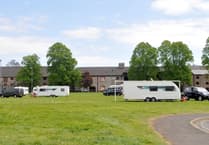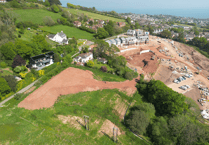Gordon Crane is a Newtonian through and through. Born in a small, second floor flat above Western Garage, Wolborough Street, in June 1931, his family shared the same floor with a surgery, from where, Gordon recalls, the good doctor would dispense 'bottles of coloured water for thrupence'. Below lived Ted Carpenter, later of Ted's Garage, Queen Street. A few years later the Cranes – including father Bill and mother Violet – known as Phil – moved to a small house in nearby Grafton Road, remaining within the self-contained Wolborough community – and its astonishing number of trades and shops. Gordon told me that before the war many considered Courtenay Street another world, so infrequent was the need to leave Wolborough. I asked Gordon to paint me a picture of his Wolborough Street. 'This was Mrs Evan's shop,' Gordon told me in his unaffected Newtonian accent, as we stood in front of the red brick house next to the Wolborough Inn. 'She used to sell sweets and various things. I used to come here for this cornet which had like a marshmallow on the top and coloured beads.' One day, Gordon's love of Mrs Evan's treats cost him a lot more than the ha'penny his mother would give him with which to visit the shop. 'I used to have to walk all up this pavement, cross by the corner and then walk back again. I was only three years old and my mother would be waiting for me down there. 'Well, one day, I decided I was a big boy and crossed here instead – and a box Austin of the day knocked me over. Being that my father was working in Western Garage, he and all the men, rushed me up the hospital. I was there for 13 weeks.' Gordon pointed out Salem Palace across the road and gestured towards the former Austin garage. 'Surely you mean Salem Place?' I asked. 'No, Salem Place is the road, he continued. 'Salem Palace is the actual building – at least we always called it Salem Palace. It was used for all sorts of things and we used to think of it more as Wolborough Church Hall than we did the actual church hall, because that have always been, near enough, a scout hut.' 'During the war, they stationed troops there, and every young boy I can remember used to come here and watch the Gloucesters train with their rifles, you know, the short arms and all the lot.' We crossed the busy road – doing our best to avoid box Austins – and stood amid the chaos that now fronts the former garage. Gesturing towards the clock tower, Gordon told me what else he remembered. 'Where we're stood, there was one or two private houses, and then came Dick Honeywill's coal yard. His daughter is still living in the town, somewhere, I believe.' Coincidentally, Gordon's grandmother, who lived at number 74, was also a Honeywill, but not related. 'Next to the coal yard,' he continued, 'was Western Garage. We used to go through Dick's coal yard or Western's as a short cut to Wolborough Street until they clamped down on us, because in the war Western's wasn't for repairing cars, but for repairing aeroplane wings. 'I know that very well because father drove the Queen Marys in the Air Force that brought the wings and aeroplanes down here for repair.' Gordon's phrase 'the Queen Marys' puzzled me, but he explained that this was the term used for the 60ft flatbed trucks used to transport the aircraft. 'On the other side of the road to Western's,' Gordon continued, 'there was St Leonard's Church, of course, and then next to that The Turk's Head. Then came the Royal Oak and The Half Moon. 'Father would buy a rabbit in the pub off a man for sixpence and, according to the market, he'd take it down to the rag store, where he would sell the skin for a penny, or even so much as thrupence.' The Turk's Head is now the Raj Belash restaurant and The Half Moon is lost under Newfoundland Way. Beyond The Half Moon, where the former Pascoe and Gill showroom now stands derelict, was 'a shop that never was a shop because an old lady lived there and there was just net curtains up'. Beyond that lay a court, Mrs Whiteaway's shop and Masons Solicitors. I asked Gordon about the courts. 'Well, we never took a lot of notice of them. Most of them were about two-up, two-down, with a stairway in the middle of the two bottom rooms. They had a tap in the yard – sometimes four shared a tap – they had toilets, but they weren't all individual, families shared them. It was all according to which court you were in.' I'd heard that families of 13 would share the cramped two-up, two-down properties. 'Oh yes, that's true. It happened,' Gordon said. He then told me something of his own difficulties surviving in Grafton Road during 1941. 'When we were bombed here, the roofs were destroyed by all the muck and stones that came from the old tan yards, which was the other side of the Torbay Mills. The blast took all the windows out. 'Now the muck and stones came through the roofs and into the bedrooms and I was under the stairs, 10 years old and the man of the household – father was in the air force. Mother had her last baby on her lap – there were five of us and my mother there – and I will never forget until my dying day my mother saying "God, please protect my little children". 'The night of this bombing, I heard men in our back yard – ARP wardens and fire watchers – saying "For God's sake let's get in here, there's a load of little kiddies". 'They picked us up and took us out and across the road to a person who had a Morrison table shelter, which is, as you know, a big heavy steel one. What seems like the next day, the men were back and erecting a Morrison's table shelter in my mother's house. I sat there until the end of the war, so I was always protected.' Three years earlier, another challenge had come their way – not from the air, but from the River Lemon, flowing just yards from their house. 'In the flood of 1938, this garden was washed away,' explained Gordon, as we stood looking at his former front yard. 'If you excavated that now you'd find all the muck and rubbish they could find to fill up the damn great hole.' Gordon offered me his theory as to why the land on this side of the Lemon had been so badly flooded. 'On the level of the ground in Salem Place were just railings – and that was where most of the water came through down there. Up here, the water flooded because of one reason and one reason only. 'This,' said Gordon pointing to the other side of the river, 'was always known as the meadows. 'The farmer had put up this galvanised iron fence with the stays the other side – and the flood occurred before it all gave way, because it held the water in just enough for the pressure to break the wall here. 'Otherwise it wouldn't have been so bad because the water would have gone across the meadows.' Gordon wanted to tell me about some of the other families who populated his streets and survived the hardships – the Campions, the Newmans, the Blacklers – but was anxious about getting his facts straight and sadly he held back. He did tell me about one boyhood friend, however, Len Coldwell, from Salem Place. 'He was always known as a terrific bowler when we all played together,' Gordon recalled. 'He went on to play for England three or four times.' I've talked to some locals who still believe it was only Len's lack of an old school tie which prevented his career from really taking off. Gordon pointed out where the three storey Torbay Mills had once stood, producing milled corn and a host of other farming supplies, and where he had started work at 14 before going on to a life on the footplate. Also on the other side of the river, Gordon told me, had been Bradley Mill, and further upstream the woollen mills. We walked along from Clarendon Road to another semi-derelict plot, behind what was once the Western Garage. 'The garage kept their taxis here and they also had the contract for the fire brigade, which, as you know, was private in those days. My father was the first officer and driver, Ted Carpenter was the second, and a chap called Pickett was the captain. 'The maroon to call the men – just a large firework really – was set off, as I remember, from a pit in the ground just here.' Unfortunately, we couldn't find the pit, but as we walked I could see the bricks and mortar of old Wolborough taking shape once more, and our stroll took us behind Ferguson's Tractors, Mid-Devon Motors, Flo Elliott's bakery, the council store and the rag store. Running between Elliott's and Mid-Devon Motors had been a twisting alleyway which linked Wolborough Street and the Lemon – or Union – Bridge. It wasn't hard to picture the characters going about their business, and I wondered about the sounds and smells. We found ourselves stood atop the Lemon Bridge, which Gordon described as no man's land because of its location between the old towns of Wolborough and Highweek. I asked Gordon about some old steps leading up from the fast-flowing river and into a long-bricked up stone archway. 'They've always been there and it have always been blocked up like that.' I wasn't expecting his next response when I suggested that the steps might once have given the occupant of a house access to fresh water. 'Well, that might be,' he said, but added chillingly: 'I could go on about people who have walked down those steps to commit suicide – but I won't.' I tried to ask him more, but he wasn't telling, simply adding: 'I know one old lady who did.' And with that the matter was closed. Gordon told me about the Odeon Bridge – just 30 yards further downstream – of which no trace remains. The path it carried led round to the cinema of the same name and in to Sun Court, next to Bidgoods the ironmongers in Wolborough Street. Highweek Way now occupies the Odeon site and Sun Court is reduced to a Teignbridge Council road name plate. On the Highweek side of the river, Gordon told me about two long-gone characters who once lived here, Sniggy Preston and a gent called Noyce. Sniggy Preston was a lady about whom Gordon retains a degree of guilt, as he and his school friends had mocked her for her unusual appearance and would knock on her door only to run away leaving her exasperated. Noyce on the other hand, would sit himself behind his front door from where, following the occasional surreptitious knock, his hand would appear and money deposited therein. Later that day, he would shuffle off to the bookies and place bets for those not keen to reveal their gaming tendencies. Our walk took us along Back Lane and deeper into Highweek and I was shown where the mills and tan yards would have sat – long filled in and free of the foul stench, even in his youth – and where he and his mates would play 'parachute' on to a disused weighbridge. Gordon then stopped and pointed out that we were standing where the 1941 bomb had dropped. It was slightly spooky to be honest, as today the similarities were striking. I asked Gordon what feelings the dereliction evoked. 'Well, I'm appalled really, because all this up here and Wolborough Street makes up about a third of Newton Abbot. It's desecrated. In our day we had more shops, be them little ones, than Newton's got now. There was everything here – it's just been left to go.' It was hard not to agree, and it struck me that the town – and the district – is facing one of those now or never opportunities. We carried on into Bradley Lane, where Gordon pointed out the former Eggbeer's orchards where his father had kept a few geese. 'One of which we'd have for Christmas, and feeding 'em on bread,' he recalled. His father had worked for Eggbeer's, where he'd become one of the country's first long-distance truckers. He worked a route taking clay to Stoke-on-Trent, returning with beer from Truman's. Close to the junction with Highweek Street, and on the site of Eggbeer's old yard, Gordon pointed out where a large wooden water wheel had once stood and where the underground leat running from Bradley Woods had been exposed for a few yards. He revealed that opposite on Halcyon Way was White's Garage, where his father would occasionally hire a car for a trip up to the moors and that a number of the old cottages hereabouts had been known as the 'bucket and chuck its'. Pondering on where it was that the underground leat finally rejoined the Lemon – and with Gordon revealing something of an abandoned schoolboy prank to follow its course under the town – we dropped into Highweek Street where he said there had been a saddlery as long as he could remember, and recalled a shop selling animal food. With our journey coming to an end, we stopped and looked out across the Wolborough Street car park and I asked Gordon how he saw the future. 'They talk about doing away with our cattle market and putting shops on it. Well, Newton without a market will be nothing – it is the farmers who come down on a Wednesday which makes the town special. 'As for this plan here. Well, we can't fill the shops we got, look at them that's empty. If we build this multi-store here we will be building another place where they will sell everything. And all this land which is Newton Abbot will just be a car park. It's beyond belief that we're handing the town over on a plate.'



